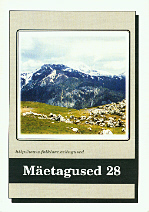"Contra Paganos" = "Maarahva vastu"? Etnoloogiliste mõistete teoloogilisest taustast
"Contra Paganos" = "Against the rural people"? On the theological context of ethnological terminology
Author(s): Dieter HarmeningSubject(s): Anthropology
Published by: Eesti Kirjandusmuuseum
Summary/Abstract: Contemporary study of history approaches popular witchcraft and magic folk culture as concepts associated with cultural dichotomies: popular culture versus high culture. The component of magic is considered most characteristic of popular culture. Aron Gurevich constructs medieval folk culture from the aspect of magic by means of early medieval books of penitence. This material, however, does not allow such construction for two reasons: firstly, the content information, and secondly, the articles on superstition and magic in the books of penitence are not targeted at peasantry. Quite conspicuously, it is often the clergy that is accused of witchcraft. The letters of witchcraft (charms), mostly spread in written form, were accessible for the literate clergy. Thus the early medieval witchcraft was clerical rather than popular. The access to the tradition of witchcraft texts makes the clergy an expert of witchcraft, to whom the people turn for advice and who are therefore persecuted in the Late Middle Ages. Therefore, witchcraft formulae moved in the downward direction.
Journal: Mäetagused. Hüperajakiri
- Issue Year: 2005
- Issue No: 28
- Page Range: 165-190
- Page Count: 26
- Language: Estonian

